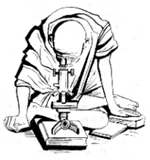

Understanding the mechanics life with Gandhi |
 In our hi-tech, state-of-the-art age, one often tends to question Gandhiji's views on industrialization and use of machinery and dismiss him as an eccentric faddist. But let us see what he had to say on the subject and then pass our judgement. Once, during an interview on this very theme, Bapu pointed to his spinning wheel and said, "It is quite wrong to say I don't believe in machinery. This spinning wheel is a beautiful piece of machinery." But he judged all machines and in fact he judged every form of material progress by what it contributed or took away from life. Ahmedabad, the city of mills, was the place where Gandhi chose to make his ashram. The ashram was a sort of a collection of huts built very simply and without any sense of architectural design or anything like that; and yet, there were so many trees around, so many fruit trees, so many flowers, that the place looked extraordinarily beautiful. And it was on a very high river bank. If the factories of Ahmedabad had a disturbing influence on the lives of the people then the ashram provided them with a natural instinctive beauty. The hum of his spinning wheel on one side of the river, was so different from the dark, gaunt mills on the other. There was a great contrast between the industrial life in India which the English brought into the country, and the very simple rural life, which Gandhi wanted his people to live. I want simple machines, not big monsters which nobody can possess," said Gandhi. "My ideal is a machine which anybody can have. With me man comes first. What is good for man is good for Gandhiji; what is not good for man is not good for Gandhi. But how is one to judge as to what is good and what is not?" In the course of a discussion with late G. Ramchandran, Gandhiji was asked many questions on his views about machinery and industrialization. One such question was "When you exclude the sewing machine, you will have to make exceptions of the bicycle, the motor car etc.?" "No, I don't," said Bapu, "because they do not satisfy any of the primary wants of man, for it is not the primary need of man to travel with the rapidity of a motor car. The needle on the other hand, happens to be an important thing in life - a primary need." The Mahatma's classic answer is even now taken as an original approach of Gandhiji for eliminating poverty. A question related to this was put forth to him, "Are you against machinery as such?" Replied the Mahatma, "How can I be against machinery? This body itself is a most delicate machine," and proceeded, "What I object to, is the 'craze' for machinery, not machinery as such. The craze is for what they call labour saving machinery. Men go on 'saving labour' till thousands are without work and thrown on the open streets to die of hunger. The force behind it all is not the feeling or intention of doing good to others by saving them from doing work, but greed. I am a determined enemy of all machinery that is designed for exploitation of people." Gandhi's idea was not to finish off all machinery but to keep a control on its use instead of abusing it. Further it was man, and not the machine, that should be the master and should dictate the terms. Besides, for him, human labour was all important. Bapu says that he would welcome an improved form of a plough. "But if by any chance one man could plough up by some mechanical invention of his, the whole of the land of India and control all the agricultural produce and if millions had no other jobs, then they would starve, and being idle, they would become dunces." Did this mean that he opposed all the great inventions? Gandhiji's response was, "I would prize every invention of science made for the benefit of all. There is a difference between one invention and another. I should not care fur poisonous gases capable of killing masses of men at a time. I also have no consideration for machinery which is meant either to enrich a few at the expense of the many, or without reason to displace the labour of the people. The machine should not be allowed to cripple the limbs of man." The Romance Behind the Singer Sewing MachineTake the case of the Singer Sewing Machine. It is one of the few useful things ever invented and there is a romance about the device itself. Singer saw his wife labouring over the tedious process of sewing and seaming with her own hands and simply out of his love for her he devised the sewing machine, in order to save her from unnecessary labour. He however, saved not only her labour but also the labour of everyone who could purchase a sewing machine. - M.K. Gandhi |